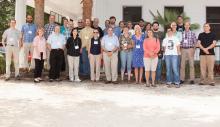Digitization Workflows
Efficient and effective workflows are at the heart of successful biological and paleontological collections digitization. Much work has been done with developing workflows and protocols at the museum and collections level, but few of these workflows have been documented or made available to the larger collections community. iDigBio, through its Documentation pages, is establishing an online repository for sharing existing customized workflows from as many collection types and institutions as possible, an idea that stems largely from the Developing Robust Object-to-Image-to-Data (DROID) workshop held May 30-31, 2012. We have assembled an initial set of workflows, including selected examples from the DROID workshop, as well as those developed by iDigBio staff. Here we offer the beginnings of the repository and encourage those in the community to both discuss the workflows via the forum links, and to contribute to this resource by adding new workflows and updating existing workflows.






